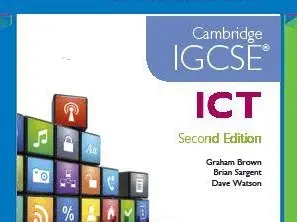
CAIE IGCSE ICT
| Responsible | Md Samsul Arefin Shamim |
|---|---|
| Last Update | 01/21/2025 |
| Completion Time | 20 hours 10 minutes |
| Members | 8 |
-
Syllabus1Lessons · 3 hr 35 min
-
595438-2023-2025-syllabus
-
-
Worksheet-11Lessons · 45 min
-
Chapter-1-Types of Component of Computer System
-
-
Excel Practice Files2Lessons · 3 hr 35 min
-
Book
-
Excel Practice Files
-
-
DB Practice Files1Lessons ·
-
Database Practice Files
-
-
Document Practice Files1Lessons ·
-
mailmerge_task 1
-
-
Summarized Notes10Lessons · 9 hr 45 min
-
Unit 1 -Types and components of computer systems
-
Unit 2 -Input and output devices
-
Unit 3 -Storage devices and media
-
Unit 4 -Networks and the effects of using them
-
Unit 5 -The effects of using IT
-
Unit 6 -ICT applications
-
Unit 7 -The systems life cycle
-
Unit 8 -Safety and security
-
Unit 9 -Audience
-
Unit 10 -Communication
-
-
Tips for answering theory paper1Lessons · 1 hr
-
tips for answering theory paper
-
-
Commonly asked theory questions1Lessons · 1 hr 30 min
-
commonly asked theory questions
-
-
Past Papers8Lessons ·
-
2012 Jun
-
2012 Nov
-
2013 Jun
-
2013 Nov
-
2014 Jun
-
2014 Nov
-
2015 Jun
-
2016 June
-
-
Notes12Lessons ·
-
1. Components of a Computer System
-
2. Types of Computers
-
3. Impact of Emerging Technologies
-
4. Input Devices - Input Pointing Devices
-
5. Input Devices - Input Reading Text Devices
-
6. Input Devices - Input Audio-Video Devices
-
7. Input Devices - Input Card Readers, Sensors and Remote Control
-
8. Output Devices
-
9. Storage and types of storage devices
-
10. Optical Storage Media
-
11. Solid State Media Storage
-
12. Network and Network Devices
-
CAMBRIDGE IGCSE INFORMATION & COMMUNICATION TECHNOLOGY (0417)
The Information Communication Technology syllabus encourages learners to develop lifelong skills, which will be useful to them in their work across the curriculum and prepare them for future employment. They will develop understanding of the implications of technology in society, including social, economic and ethical uses and awareness of the ways ICT can help in home, learning and work environments. The syllabus combines theoretical and practical studies focusing on the ability to use common software applications to solve problems, including word processors, spreadsheets, databases, interactive presentation software, web browsers and website design. Learners analyse, design, implement, test and evaluate ICT systems, ensuring that they are fit for purpose. Assessment of the practical tests is hardware and software independent. Any hardware platform, operating system, and applications packages can be used, providing that learners have the opportunity to demonstrate the full range of skills in the syllabus.
The CAIE IGCSE ICT (Cambridge Assessment International Education International General Certificate of Secondary Education in Information and Communication Technology) is an internationally recognized qualification for students aged 14 to 16. It provides a comprehensive understanding of how ICT is used in various contexts, including business, education, and everyday life.
Key Areas of Study
- Theory of ICT:
- Types and Components of Computer Systems: Hardware, software, input and output devices
- Networks and the Effects of Using Them: Types of networks, benefits, and risks
- Data Types, Organization, and Storage: Different data types, databases, data storage methods
- The Impact of ICT on Society: Social, ethical, and environmental issues related to ICT
- ICT Applications: Uses of ICT in various fields like business, education, healthcare
- Practical Skills:
- Using Software Applications: Word processing, spreadsheets, databases, presentation software
- File Management: Organizing and managing files and folders
- Web Authoring: Creating and maintaining websites
- Image Editing: Using software to manipulate images
- Communication: Effective use of email, internet, and other communication tools
Assessment
The assessment consists of three components:
- Paper 1: Theory (40% of the final grade)
- Written examination
- Tests theoretical knowledge of ICT
- Paper 2: Practical Test A (30% of the final grade)
- Practical examination
- Assesses skills in using software applications and file management
- Paper 3: Practical Test B (30% of the final grade)
- Practical examination
- Assesses advanced practical skills in web authoring, image editing, and communication
Skills Developed
- Technical Proficiency: Understanding and using various ICT tools and software
- Problem-solving: Applying ICT solutions to real-world problems
- Communication: Effective use of ICT for communication and collaboration
- Digital Literacy: Awareness of the impact of ICT on society and ethical considerations
Resources for Preparation
- Textbooks and Study Guides: Comprehensive materials covering all syllabus topics
- Online Learning Platforms: Websites offering tutorials, exercises, and past exam papers
- Practical Software Tools: Access to commonly used software applications for hands-on practice
Preparation Tips
- Understand the Syllabus: Ensure you cover all topics outlined in the syllabus
- Practice Regularly: Use software applications frequently to build practical skills
- Use Past Papers: Familiarize yourself with the exam format and practice with previous exams
- Join Study Groups: Collaborate with peers to discuss and solve problems